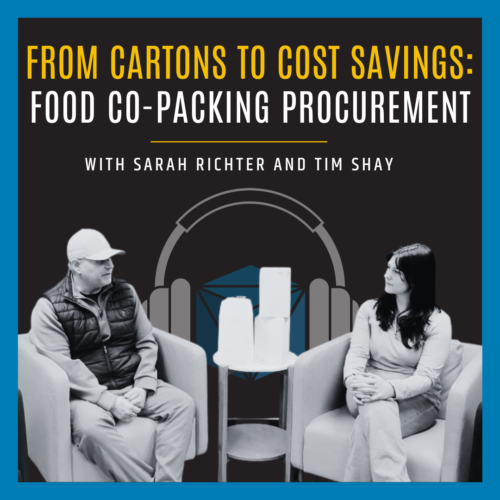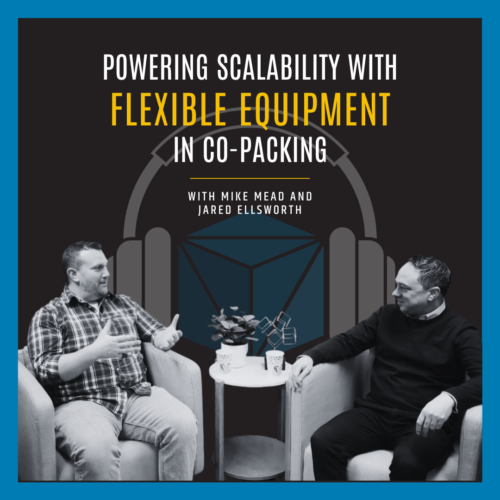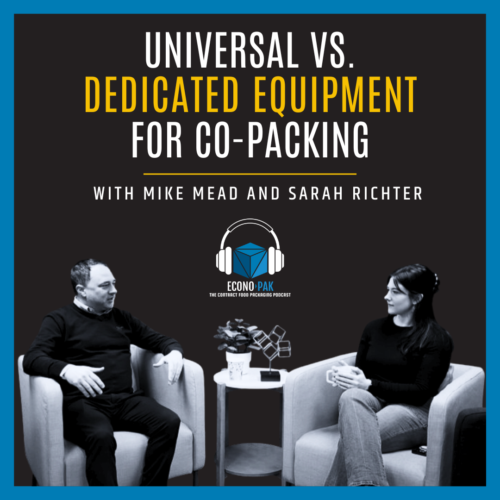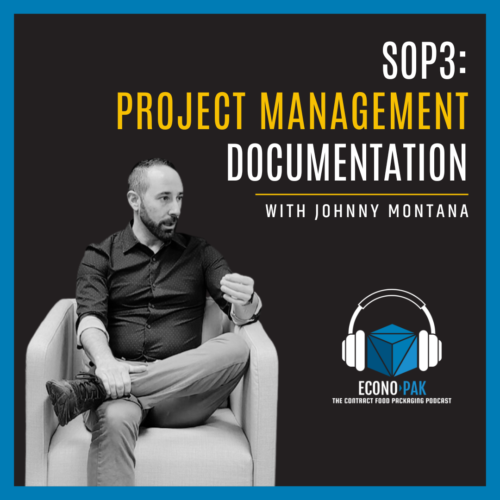Food Safety and Continuous Education with Senior Director of Quality Rohail Khan
Rohail Khan, Econo-Pak’s Senior Director of Quality and Food Safety, details his career journey, his expertise in the food industry, and the innovative practices at Econo-Pak that ensure the highest food safety and quality standards.
This transcript offers a detailed look into our conversation, providing valuable insights for anyone interested in the complexities and challenges of maintaining excellence in the food packaging industry.
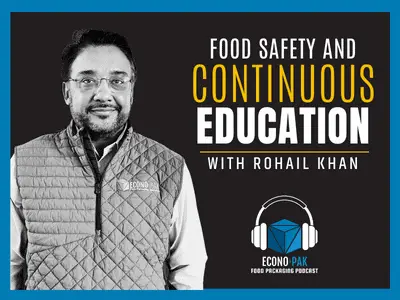
Rohail’s Background and Passion for Food Safety
Sarah Richter: Welcome to the Econo-Pak Food Packaging podcast. Today I’m here with Rohail Khan, our Director of Quality. Thank you for joining us today.
Rohail Khan: Thank you for having me, Sarah. I think this is a great idea, essentially to get to know ourselves, I would say, and to share our knowledge and learn about different departments too. I think the previous podcasts have been great. I work with these people on a day-to-day basis, but getting to know them more closely and sharing it with my team members has been a great idea. Thank you for arranging this, and I feel honored to be part of this too.
Sarah Richter: Oh, thank you. Well, we want to ask you a little bit about your background. What led you to become the Senior Director of Quality at Econo-Pak?
Rohail Khan: The position has a name, but definitely, food safety and quality have been my passion. I’ve been in the food industry for around 14, 15 years. When I joined the industry, it was a learning experience at that point. Even now, it’s a learning point in my career because there’s always something new to be aware of, your surroundings, the updates you’re going through. Again, as I said, it’s an interesting field, food safety. When you talk about quality, it’s great. The new challenges that you see with the influx of food from different countries, like now we are talking about a small world when we talk about the food industry. The food industry used to be more domestic, locally grown, but now you might be eating a dinner that has ingredients from 20 different countries, some places where they have highly regulated food safety measures and some countries where things are not as regulated.
So again, it’s about making sure what we do on a day-to-day basis with food safety. That motivates me on a day-to-day basis. So it is an interesting and challenging job as well, but managing that and working with the team on these topics helps me a lot. One of the things, the second part of your question, working at Econo-Pak, when I was going through my interviewing process and visiting the facility, the things that I liked were the management that attracted me to join the company and later on working with the company. Sometimes, at some places I have been, they don’t factor in food safety or capital investment as a big measure. Whereas since the time I’ve been here, let’s put it this way, things have been pretty much easier when it comes to capital investment on quality testing methods or investing in the team itself. I think the management has been helping me a lot with those things. And the other thing is the different kinds of products that we deal with on a day-to-day basis, which interests me working at Econo-Pak on a day-to-day basis.
Sarah Richter: So I think it’s accurate to say that you’re a food safety nerd.
The Importance of Continuous Learning in Food Safety
Rohail Khan: I do like to keep myself updated, let’s put it that way. Even if things going on in the industry are not related to the products that we handle on a day-to-day basis, I like to learn. Again, as I said initially, my biggest thing is to keep updating and learning about what’s going on in the industry. There’s so much to learn, so much to absorb on a day-to-day basis. You have new trends coming in, new products coming in. You have new regulations that are playing into the industry because now when we talk about exporting or importing products, that’s another area of your food safety portfolio. So I think, I wouldn’t call myself a nerd, but a student, I would say.
Mike Mead: Well, I know you’ve spent a lot of time continuing to educate yourself, like you mentioned, and you’ve attended several conferences in the past year as well. I’m sure that provides a lot of industry insight on what retailers are looking for, what different brands are looking for, and different requirements and things like that.
Rohail Khan: Definitely, hearing from other experts, who are more educated and experienced than me in the industry and who deal with different regulatory bodies too. So I do attend, besides on a regular basis, webinars. That happens probably twice a week sort of thing. Then learning about some of the changes in the industry, what’s going around. I think it falls back onto that you have to keep yourself updated about what’s going around in the industry because if somebody just closes the door on knowledge and thinks that they are fully educated, I think that’s probably when it’s better to retire.
Understanding Econo-Pak’s Approach to Food Safety
Sarah Richter: Can you explain what food safety culture is and what goes into it?
Rohail Khan: Going back to food safety, it’s not just my responsibility. Let’s talk about our company here. It’s not just my responsibility or my department’s responsibility or an individual department’s responsibility. It’s a collective effort that plays roles by everybody in the facility. Food safety is everybody’s responsibility. When you talk about management, you talk about different departments, you talk about the different process steps you can go through. At every process step, there can be a food safety issue. You talk about receiving the product, storing the product, going through production. In a manufacturing world, as the old saying goes, there are three big variables where you see deviations: people, product, or process. In my learning or my experience, people are always the challenging one, but food safety culture is an area of different responsibilities and communication and experience that you go through with educating your people, I think.
So that’s important. Somebody might be doing the same thing for the last 10 years, let them know if they’re doing it correctly. It works both ways. If they’re working wrong, you need to teach them rather than just dictating to them that this thing is wrong and don’t do it. But in my understanding, if you explain to that person why you’re doing it, what was the idea? So you’re communicating some of their knowledge back to them, which helps in the long run, I think.
Sarah Richter: For sure. And you’re currently working on a new training video that we show every year?
Rohail Khan: Yes. In recent years, our approach to PowerPoint slides was fairly standard. However, this year we’ve evolved it significantly. Now, we’re actively involving everyone, ensuring they present and take ownership of the slides, particularly regarding food safety. This not only engages our current employees but also helps newcomers understand our food safety policies and procedures.
Food Safety and Allergen Management at Econo-Pak
Sarah Richter: That’s great. I’d like to discuss our allergen management protocol. Could you elaborate on that?
Rohail Khan: Certainly. At Econo-Pak, we handle various allergens. Primarily, we deal with shelf-stable dry goods, acting as a co-packer or co-manufacturer for our clients. Most products we receive are ready-to-eat, so we don’t handle many ingredients. However, these products have diverse allergen profiles – some containing multiple allergens, while others have none. Managing different allergen profiles can be challenging. To address this, we’ve segregated areas in our facility based on these profiles. We focus on aligning products we process daily and have established specific lines for different allergens to minimize changeovers. In food manufacturing, cross-contamination during changeovers is a risk, especially if equipment isn’t thoroughly cleaned. To mitigate this, we prioritize managing allergen profiles. When introducing a new product, we first consider its allergen profile, where and how it will be processed. Additionally, we conduct extensive allergen testing, both in-house and through third-party labs, to validate our methods.
Leveraging Technology for Enhanced Food Safety
Sarah Richter: How does technology contribute to monitoring and improving food safety at Econo-Pak?
Rohail Khan: Technology plays a significant role in enhancing food safety, just as it does in other industries. We continuously update our platforms to stay current with market trends. This investment has shown a good return, making processes more efficient. With digital reporting, we can respond quickly to incidents, as information is sent directly to my email. This centralized approach also facilitates smoother transitions when team members move to different roles, streamlining processes and improving product traceability.
A Deep Dive into Food Safety Standards and Certifications
Mike Mead: Can you discuss the various food safety standards, certificates, and certifications we maintain?
Rohail Khan: Absolutely. At Econo-Pak, we hold several food safety and identity preservation certifications. Our main certification is SQF, which is based on the GFSI (Global Food Safety Initiative) model. This model encompasses all the globally accepted food safety elements that need to be followed daily. Econo-Pak has been SQF certified for many years. We continuously monitor our programs to ensure they align with the GFSI-SQF and regulatory requirements. In addition to the food manufacturing side of SQF certification, we also hold the quality side, which is not common among all companies. This decision reflects our commitment to maintaining high standards, as evidenced by our successful SQF audits in the past.
Apart from SQF, we handle certain identity-preserved foods and hold various certifications, including Organic, Kosher, and Gluten-Free certified products. These certifications relate to our allergen management, as our programs and processes have been vetted and verified by both regulatory bodies and third-party certification bodies. Furthermore, they are regularly audited by our customers, some of whom are global companies with broad-based programs extending beyond the United States to include Canada and other countries.
We are always open to accommodating our customers’ requests. For instance, if a customer needs a product certified for Europe, we adapt to their requirements. While Econo-Pak is audited for several certifications based on customer needs, we don’t hold all these certificates ourselves. Our philosophy is to do the right thing daily and ensure our food safety practices are up to standard. Overall, we are certified by globally recognized standards.
The Continuous Improvement Process in Food Safety
Mike Mead: That’s great. Going back to what Sarah mentioned earlier about education, it’s impressive how your team is constantly learning. You spend a lot of time keeping up with standards and regulations. It’s great to see your team members excited about learning. I know you regularly conduct learning sessions in the conference room, sharing statistics and new information. That’s an excellent approach.
Rohail Khan: I want to emphasize that it’s a continuous improvement process. I believe in sharing knowledge rather than keeping it to myself. So, I share as much as I can with my team members, enabling them to make informed decisions. Apart from internal trainings, we also send team members to various certification programs. I believe that as much as my team members can learn from me, I can learn from them. This approach fosters better communication.
Sarah Richter: Never settling is key. I have a question about SQF. When auditors come, what are they looking for? What do we need to do to achieve level three, the excellent level?
Rohail Khan: SQF certification, like others under GFSI, adheres to standards set by the Codex, established by WHO. Auditors verify that we are following these standards. An audit is about confirming our compliance with the standard. There are different modules, and during the audit, which lasts several days, auditors check that our programs align with GFSI requirements and our practices match our documentation. I’ve been fortunate to work with understanding auditors who judge based on the standards. So, for us, it’s not just about the day of the audit; it’s a day-to-day process. Yes, we face challenges daily, as is common in manufacturing. But consistently following the standard is key to what the auditors are looking for.
Mike Mead: The technology you mentioned earlier must also help in keeping records organized and responding efficiently to any needs.
Rohail Khan: In my experience, auditors have appreciated our technology. Having documents readily available for immediate display on screen makes the process smoother and more efficient. In fact, many auditors have commended us for this setup in our workflow. Extending this topic a bit, we are working towards going paperless within the next six months. This will enable us to retrieve documents quickly, saving time that would otherwise be spent digging through papers and binders. Technology significantly aids in this aspect.
Maintaining Quality Standards in Food Packaging at Econo-Pak
Sarah Richter: We’ve talked a lot about food safety, but we also deal with food packaging. Can you discuss how we maintain our quality standards in packaging?
Rohail Khan: Sure. Our quality standards revolve around continuous monitoring, which is crucial for packaging. In manufacturing, where bulk production occurs, checks might be done every two or three hours, allowing for product rework if needed. However, in packaging, lacking continuous monitoring can be problematic, as it doesn’t allow for reworking products after several hours of production. We’ve established programs based on industry levels, focusing on weight checks, packaging integrity, and ensuring that the product we produce meets the standards of our customers’ brands. We take our role in the supply chain seriously and strive to protect our customers’ brands. We don’t make decisions for the consumer, but as a part of the supply chain, we ensure continuous monitoring. We’re also incorporating more technology into our inspection processes, including camera systems, label inspections, and testing of seals.
Mike Mead: That investment in quality, equipment, technology, and team building is a significant aspect of Econo-Pak. It’s vital for brands seeking to scale their products to mass market. These brands often start small and then realize the need for more stringent guidelines to achieve scalability. Econo-Pak’s ability to meet these standards is a key benefit we offer to our customers.
Rohail Khan: Yes, and this approach helps us work not only with large, global clients but also with startups. We’ve seen small projects for clients grow into dedicated production areas. We guide our customers, educating them about food safety and regulatory requirements. What excites me about working here is our management’s mindset. They’re not only accommodating in helping new businesses but also in expanding the portfolios of our existing customers with different products.
Mike Mead: Your mindset of sharing knowledge extends across the company. It’s fantastic to see. Sharing knowledge is essential, and it’s exciting to help brands scale to mass market.
Key Metrics for Measuring Quality in Food Safety
Sarah Richter: What key metrics do you use to measure quality?
Rohail Khan: We’ve established various KPIs for my department, focusing on food safety and quality. One major metric is consumer complaints, which have decreased by over 40% in the last three years. This improvement mainly pertains to quality rather than food safety. Considering the millions of packages we produce monthly, reducing consumer complaints is a significant focus. Other key metrics include pest management and monitoring the weight of packages and sanitation effectiveness. I also prioritize educating my team, not just internally but also in advancing their careers and certifications. Continuous improvement is crucial, and it’s about how we mitigate risks, like allergen handling, in our facility.
Sarah Richter: Before we wrap up, can you share a bit about your life outside of work?
Rohail Khan: Family is my priority. I spend most of my time with them. I’ve recently taken up golf and enjoy other sports regularly. Following sports is one of my biggest interests. I’m also a food enthusiast. My motto is to respect others to earn respect in return.
Sarah Richter: Awesome. Well, thank you so much for joining us today, Rohail. It was awesome to speak with you.
Rohail Khan: Thank you for this opportunity and I appreciate you guys. Thank you.
Sarah Richter: Alright, thank you.
In this episode, we had the privilege of uncovering the layers behind food safety and quality with Rohail Khan, Senior Director of Quality and Food Safety at Econo-Pak. His insights and experiences highlight the critical role of continuous learning, technological advancements, and team collaboration in ensuring the highest standards of food safety. From handling allergens to maintaining quality in packaging, Rohail’s expertise offers valuable lessons for professionals across the industry.
We thank Rohail for his time and knowledge shared in this episode, providing our listeners with a comprehensive understanding of the diligence and dedication behind Econo-Pak’s success in the food packaging industry. Stay tuned for more insightful discussions in our upcoming podcasts.
Let's start scaling.
Is your demand outpacing your ability to package your own product? Then consider outsourcing with Econo-Pak.
With over 40 years of experience working with both small brands and Fortune 500 companies, we are capable of handling your specific dry food product.
Get in touch with our team for a fixed-price quote for your project.

